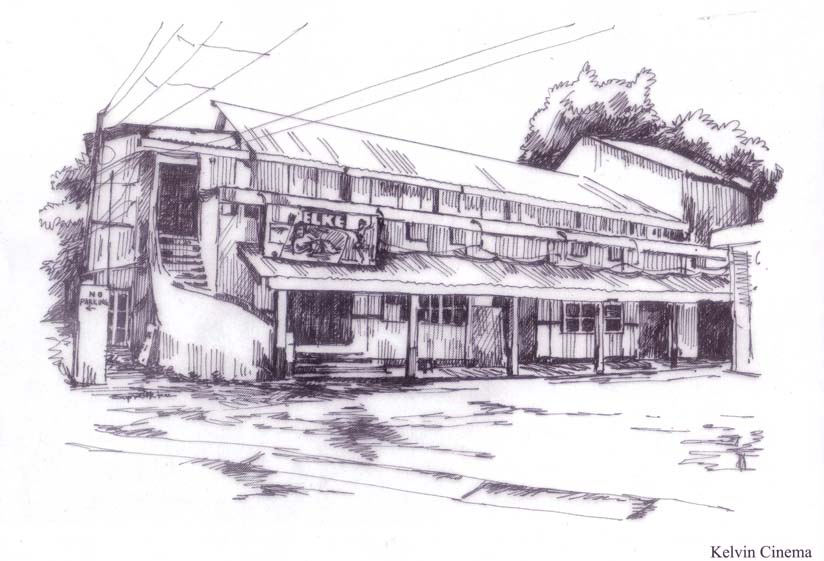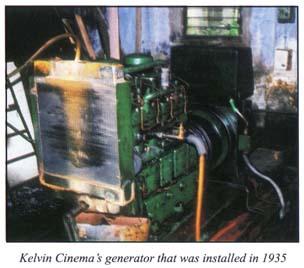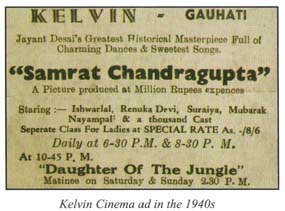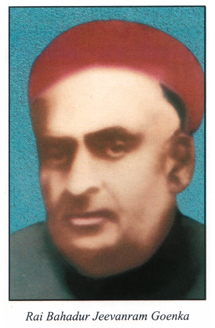| SHAPING A CINEMATIC TRADITION |
 |
A hundred and twenty-five years ago a young man byname of Ganeshdas Goenka came all the way to Assam from Rajasthan in search of fortune. He settled down in Shillong, the then administration headquarters and began trade by exporting potatoes and ginger to Calcutta. In no time business began to flourish and Ganeshdas decided to settle down. He got married, set up house and became the first Mawari family to put down roots in the picturesque hill town.
|
With the passage of time the Goenkas were blessed with two sons, Balchand and Jeevanram, who grew up and joined the family business. Jeevanram was an enthusiastic youth with brilliant ideas, and was intent on diversifying the family business. Once he came into contact with one Mr. Unger who showed him the use of a cinema projector and Jeevanram immediately struck upon the idea of opening a cinema hall. It was not long before the idea translated into reality and Kelvin Cinema, the first full-fledged cinema hall of Assam, came up at Shillong. It was named after the German-make Kelvin brand movie projector than ran on kerosene and petrol. |
|
The hall was an instant success, soon prompting Jeevanram to start a similar venture in Guwahati. A 2.2 bigha plot of land that his father Ganeshdas had bought way back in 1895 for Rs. 500 in the Fancy Bazar area was chosen as the site and with help and encouragement from Mr. Unger, the doors of the second cinema hall of Guwahati were opened in 1935. The hall, again named Kelvin, had an audience capacity of 302 persons who could sit on chairs, benches or planks to enjoy the films. For Jeevanram it was an achievement that was all the more heartwarming since a year ago, in 1934, the British government had bestowed on him the title of Rai Bahadur in recognition of his immense contribution and service to the government.
|
|
Unfortunately for the entrepreneur, the joy was brief since the hall in Guwahati did not as well as imagined. In the space of two years it had to let out on lease to a gentleman called Biajnath Chowdhury. Chowdhury ran the hall successfully for nearly two decades, and it was only in 1956, after extensive litigation, that the hall once again passed into the hands of the Goenkas. By this time the next generation, Shankar and Mahavir Goenka, had taken up the ropes of the business and the pages of a fresh chapter in the history of the hall was turned. In the 1940s vast sums of money poured into the cinema industry worldwide and entertainment was big business. Kelvin Cinema also reaped the benefits that trickled down. The American and Allied soldiers stationed in the town spent lavishly on watching movies and business thrived like never before. In 1956 a new Philips projector was installed replacing the old Kelvin, but the hall retained its name. While conducting business the Goenkas had established a good rapport with the Assamese film industry and several Assamese films of the 1950s and 1960s were released in Kelvin. |
Era Bator Sur, Shakuntala, Ganesh, Mukuta were but a few. The first documentary filmed on literature Lakshminath Bezbourah was also released at this hall by Bishnuram Medhi. The family album of the Goenkas is replete with photographs of the crème de la crème of Assam’s political and socio-cultural life -- Bishnuram Medhi, FA Ahmed, Moinul Haque Chowdhury, Bhupen Hazarika, Vidya Rao, Girish Choudhury, Gyanada Kakati and others - in moods and moments at the Kelvin cinemas in both Guwahati and Shillong.
Shankar Goenka and his son Siddharth who are managing the hall at present, recall with pride some of the ‘firsts’ that the Kelvin group of cinema halls - Kelvin, Anjali and Bijou in Shillong and Kelvin in Guwahati - is credited with. It was this group that introduced the first cinemascope, the first “television” and the first 70 mm hall in Assam. When Mughal-e-Azam was released it become a big hit and to cope with the rush extra shows had to be screened in the pre-noon and afternoon. This was later to lead to permanent incorporation of matinee and noon shows in all movie theatres. It was also at Kelvin that an English film was screened in the town for the first time.
|
The hall also holds the unique distinction of screening the “single hall golden jubilee movie” in Assam: Jai Santoshi Maa ran uninterrupted for 53 weeks, a record that remains unbroken till date. The movie generated unprecedented euphoria, and encouraged the hall’s operators, Khoka and Bhimlal Singh, to perform a puja in front of a cutout of the goddess before starting up the machine each morning. Kelvin had the Midas touch. Most of the movies released here in the period between the 1950s and 1970s went on to celebrate silver jubilees - Aan, Kimat, Anarkali, Mughal-e-Azam, the list goes on. Once during a show of the movie Nagin, two snakes suddenly slithered their way in front of the screen. The news spread like wildfire and the film distribution circles as the Silver Hall. |
 |

